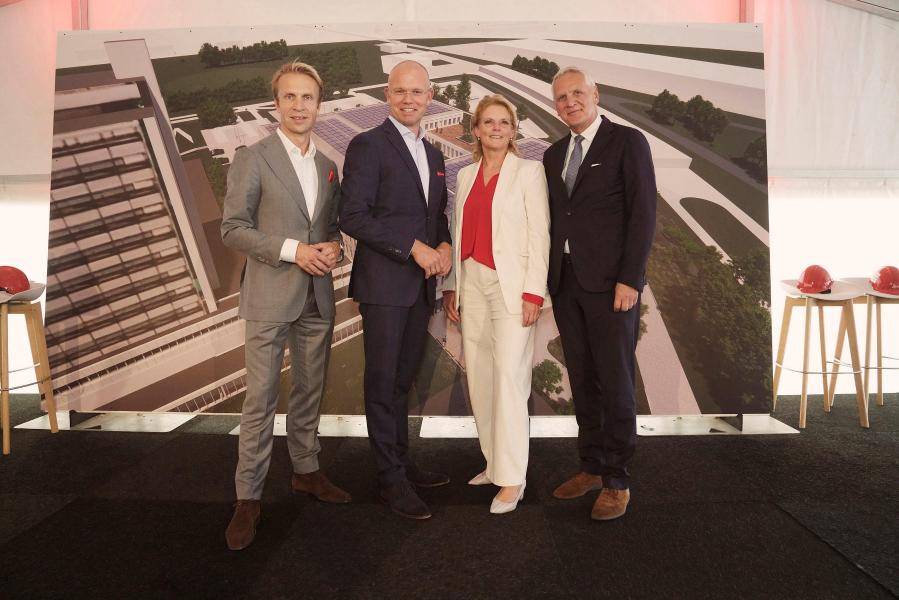
The hospital is investing in the healthcare of the future with the EU climate bank as main financier.
- Franciscus Gasthuis & Vlietland has begun construction of a new, sustainable and energy-efficient hospital building, which will open in 2026 and is located alongside the current Franciscus Gasthuis in Rotterdam.
- The lion’s share of the finance, €80 million, is coming from the EIB.
- The new building is designed by architect Take Vrijlandt from the architecture firm a/d Amstel, with a focus on patient wellbeing, excellent working conditions for healthcare professionals, and a lot of attention paid to environmental aspects.
A ceremony that took place today marked the launch of construction works to build the new centre for clinical excellence, the Franciscus Gasthuis & Vlietland hospital in Rotterdam. After the contracts were signed earlier this year, construction has now begun. The ceremony was attended by representatives of the European Investment Bank (EIB) — the EU climate bank — and the contractors*, and saw the last symbolic pieces of the puzzle put into place.
The new hospital will house three essential services: firstly, on the ground floor, the Spoedplein Rotterdam Noord emergency department, with emergency care professionals and out-of-hours general practitioners working alongside each other in one place; secondly, on the upper floor, a future-proof operating suite and intervention centre with state-of-the-art technology for surgical interventions and X-ray imaging, including two hybrid operating theatres, to ensure that patients get the very best possible care for every individual situation; and thirdly, a maternity centre, where the hospital will work closely with obstetricians and midwives, in line with the hospital’s standards and ambitions for family-oriented care. The maternity centre offers single rooms where parents or caregivers can stay in the room with their new-born child. It also features first-line delivery rooms and a Ronald McDonald Lounge.
Chair of the Board of Franciscus Niels Honig said: “With this sustainable new construction, we are investing in the healthcare of the future. For the region’s residents, this means access to excellent care, and for healthcare professionals, a modern and pleasant working environment. We will maximise the use of daylight, and our energy needs will be largely met with our very own solar panels. The new construction will not be reliant on using gas, and instead will use heat pumps, energy storage and energy recovery. That will make for a vast improvement to the hospital’s climate profile.”
“On the occasion of our National Sustainability Week, the start of this new construction is not only a significant milestone for Franciscus, but also sends out an important signal to the Dutch healthcare sector. It is a new construction aligned with the need for sustainability. The European Investment Bank, as financier, is contributing to the quality and sustainability of the healthcare sector. In challenging times, with COVID, inflation and a tight labour market, it is of even more paramount importance to keep the long-term view in mind. The new hospital building fits in with that perspective and we are therefore delighted to support this plan,” added EIB Vice-President Kris Peeters.
Chantal Zeegers, who oversees climate, building and housing in Rotterdam City Council attended on behalf of the municipality, saying: “I am delighted to attend the start of construction of a sustainable hospital. This development offers the opportunity to better connect with our surroundings, with the added benefit of the hospital being renovated and improvements for the environment too. There will be a green public space to rest and relax, with excellent green routes for pedestrians and cyclists, which is not only good news for patients, but for all Rotterdammers. Together, we are building a greener and healthier future for our city.”
Background information:
The European Investment Bank (EIB) is the European Union’s long-term lending institution directly owned by the EU Member States (the Netherlands owns 5.2% of these shares), and can therefore borrow on the capital markets at very advantageous conditions. As a result, the EIB can make long-term financing available for sound investments that contribute towards the European Union's policy objectives. Over the past five years, the EIB has supported the modernisation and new construction of hospitals and clinics throughout the Netherlands for an amount of €1.3 billion.
*The constructors Berghege Heerkens bouwgroep, ULC and Unica.

